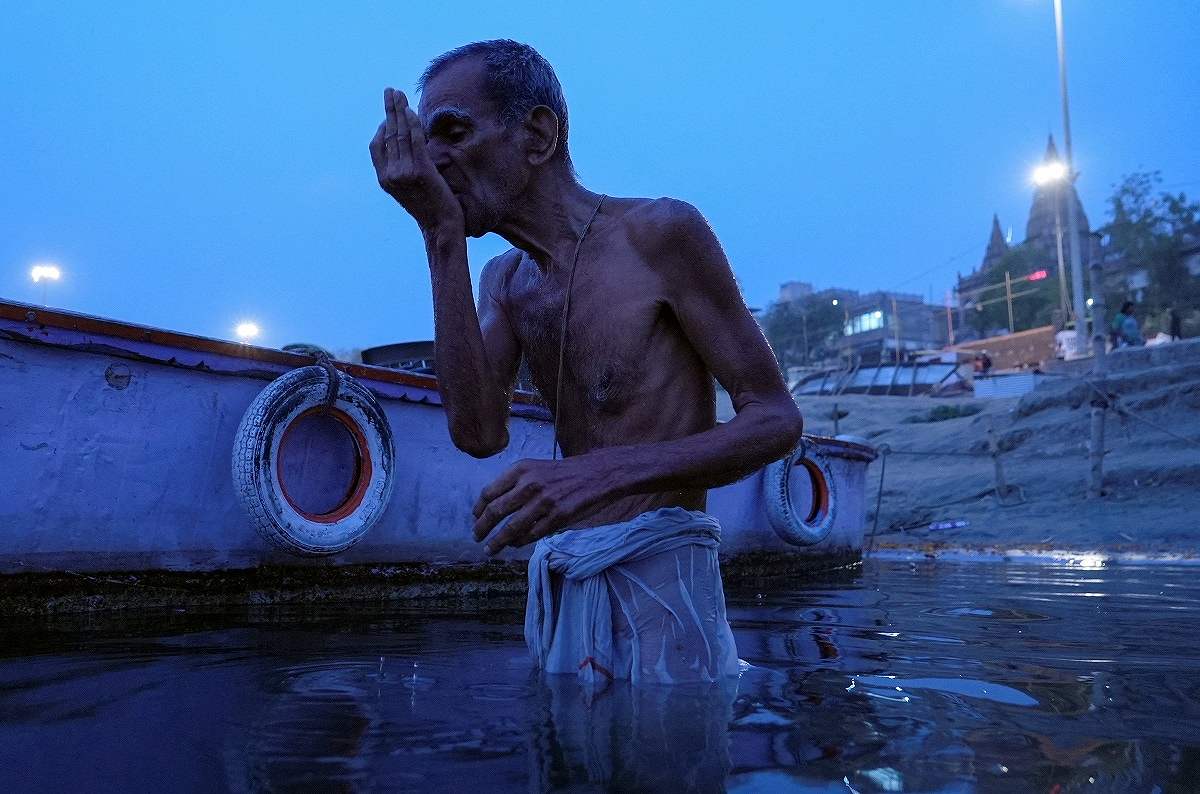
Retiree Murali Mohan Sastry, 82, drinks water from the Ganges River during a morning prayer in Varanasi, India, on March 8.
17:30 JST, May 4, 2023
VARANASI, India (Reuters) — Murali Mohan Sastry is waiting peacefully for death on the banks of the Ganges River in India’s northern city of Varanasi, revered by millions of Hindus.
More than a decade ago, the 82-year-old former college teacher and his wife left behind comfortable lives in the southern city of Hyderabad.
Now he hopes that by dying in Varanasi, he can break the tenuous cycle of death and rebirth, an article of faith for many Hindus, in order to attain salvation.
“We invite death,” Sastry said soon after chanting his dawn prayers while dipping fully clothed into the waters of the river three times.
“And he’s our guest, actually. So we are proud that we are going to die here.”
The couple, who live in one of the spartan community homes across the sacred city meant for those seeking to live out their twilight years there, were inspired by the example of his mother, who had lived in the same place.
Although Western-style retirement homes are growing popular, Sastry has no interest in worldly comforts, preferring to spend his final days immersed in study and prayer.
“Our Indian philosophy is, those who seek worldly comforts can never go to God, can never reach God,” said the white-haired Sastry, his shoulders draped in a yellow shawl with scriptural phrases picked out in saffron.
“As far as possible, shun all these things. Don’t go for them. Go only for God.”
More than a million people live in the ancient city famed for its temples and bathing spots beside Hinduism’s holiest river to which the devout flock from all over the country for rituals marking events from birth to death.
“Now I don’t feel like living in this world anymore,” said Ram Pyari, another resident of the home, as she prepared a meal for her husband, who is mostly confined to bed in what he is certain are his final days.
“One has to face so much suffering that one gets fed up. So you feel that if you attain salvation then you won’t have to suffer anymore,” added Ram Pyari, who is in her 80s.
The manager of the home, Mumukshu Bhavan, which dates from the 1920s, says it has reached full capacity, with more than 80 residents, although demand for places remains high.
“More and more old people want to come and stay in Varanasi,” said the official, Manish Kumar Pandey. “But we can only accommodate a limited number.”
Still, the devout unable to breathe their last in the holy city can take solace from the Hindu belief that they will come a step closer to salvation if their remains are cremated there.
Top Articles in World
-

Israeli Ambassador to Japan Speaks about Japan’s Role in the Reconstruction of Gaza
-

Videos Plagiarized, Reposted with False Subtitles Claiming ‘Ryukyu Belongs to China’; Anti-China False Information Also Posted in Japan
-

Nepal Bus Crash Kills 19 People, Injures 25 Including One Japanese National
-

South Korea Tightens Rules on Foreigners Buying Homes in Seoul Metro Area
-

Ukrainian Ambassador Closely Watching Japan’s Revision of Defense Export Rules, Hopes for Future Arms Support
JN ACCESS RANKING
-

Producer Behind Pop Group XG Arrested for Cocaine Possession
-

Japan PM Takaichi’s Cabinet Resigns en Masse
-

Man Infected with Measles Reportedly Dined at Restaurant in Tokyo Station
-

Israeli Ambassador to Japan Speaks about Japan’s Role in the Reconstruction of Gaza
-

Videos Plagiarized, Reposted with False Subtitles Claiming ‘Ryukyu Belongs to China’; Anti-China False Information Also Posted in Japan

























